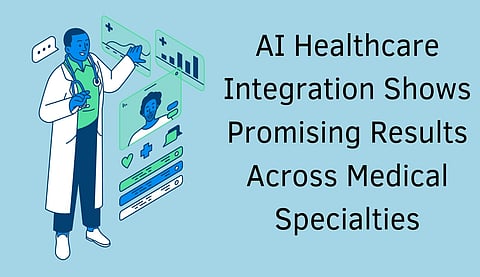

A groundbreaking research paper published in the International Journal of Research in Computer Applications and Information Technology examines the transformative role of AI in healthcare. Author Kanagarla Krishna Prasanth Brahmaji, a Data Architect from the USA, presents a detailed analysis of how AI is enhancing medical diagnostics, treatment planning, and administrative efficiency while carefully addressing the ethical challenges and privacy concerns that accompany this technological revolution.
The healthcare AI landscape has evolved dramatically since its inception in the 1970s as basic rule-based systems. Today's sophisticated deep learning applications, especially neural networks in medical imaging, achieve over 95% accuracy in specific diagnoses. These advanced systems can simultaneously analyze complex medical data across multiple modalities, revolutionizing diagnostic capabilities in modern medicine.
Recent implementations of AI systems have demonstrated substantial improvements in healthcare delivery. The technology has shown a 30-40% improvement in diagnostic accuracy, while helping reduce patient wait times by 50%. In medical imaging analysis, current deep learning algorithms achieve detection rates of 97% for certain cancerous lesions, significantly outperforming traditional manual analysis methods.
Personalized Treatment Revolution AI-driven personalized medicine has transformed treatment approaches across medical specialties. By analyzing individual patient characteristics, genetic profiles, and treatment response patterns, these systems have shown a 30% improvement in treatment response rates and a 25% reduction in adverse drug reactions. The technology has also accelerated drug development, reducing the timeline from compound identification to clinical trials by up to 50%.
The integration of AI in healthcare administration has revolutionized operational workflows, delivering measurable improvements across multiple areas. Advanced AI systems have slashed patient wait times by 40% through intelligent scheduling and resource management, while simultaneously boosting resource utilization by 35%. In the crucial area of medical documentation, AI-powered automation has transformed traditional processes, reducing coding errors by an impressive 60% and accelerating documentation completion by 45%. These improvements extend to billing accuracy, which has seen a 30% enhancement, and revenue cycle efficiency, showing a 25% increase. Healthcare facilities implementing these AI solutions have also reported optimized staff scheduling, better inventory management, and more accurate predictions of patient admission patterns, leading to more efficient allocation of medical equipment and facilities.
As AI systems manage an average of 665 terabytes of patient data per hospital, robust security protocols have become crucial. Healthcare organizations are implementing comprehensive frameworks that address patient privacy, data security, and consent management. These frameworks ensure HIPAA compliance while maintaining accessibility for AI systems, with encryption standards meeting or exceeding regulatory requirements.
The research exposes critical concerns about algorithmic bias in healthcare AI systems, where studies have uncovered significant data representation gaps - with up to 60% underrepresentation of certain demographic groups in medical datasets. Healthcare institutions are responding with comprehensive measures, including diverse population testing, systematic bias audits, and continuous performance monitoring. These rigorous validation processes aim to eliminate disparities in diagnostic accuracy, screening algorithms, and treatment recommendations across all demographic groups, ensuring equitable healthcare delivery through AI systems.
The future of healthcare AI focuses on developing explainable AI architectures with transparency ratings above 85% and advanced neural network models for multi-modal medical data. Edge computing solutions are being developed to reduce data latency by 60%, while real-time learning systems are showing 40% improvement in treatment optimization.
Healthcare providers are adapting to this AI-augmented environment through comprehensive training programs. These programs focus on maintaining clinical expertise while leveraging AI tools, developing new skills for AI system interpretation, and managing patient expectations regarding AI capabilities. The implementation of clear decision-making hierarchies and override protocols ensures proper human oversight of AI recommendations.
In conclusion, Kanagarla Krishna Prasanth Brahmaji's comprehensive research illuminates AI's transformative impact on healthcare delivery, showing improvements of up to 40% in early disease detection and 35% reduction in medical errors. His findings emphasize that sustainable AI integration in healthcare requires a delicate balance between technological advancement and ethical governance, underpinned by robust regulatory frameworks and active collaboration among healthcare providers, technologists, and policymakers to ensure patient safety and equitable care delivery.
